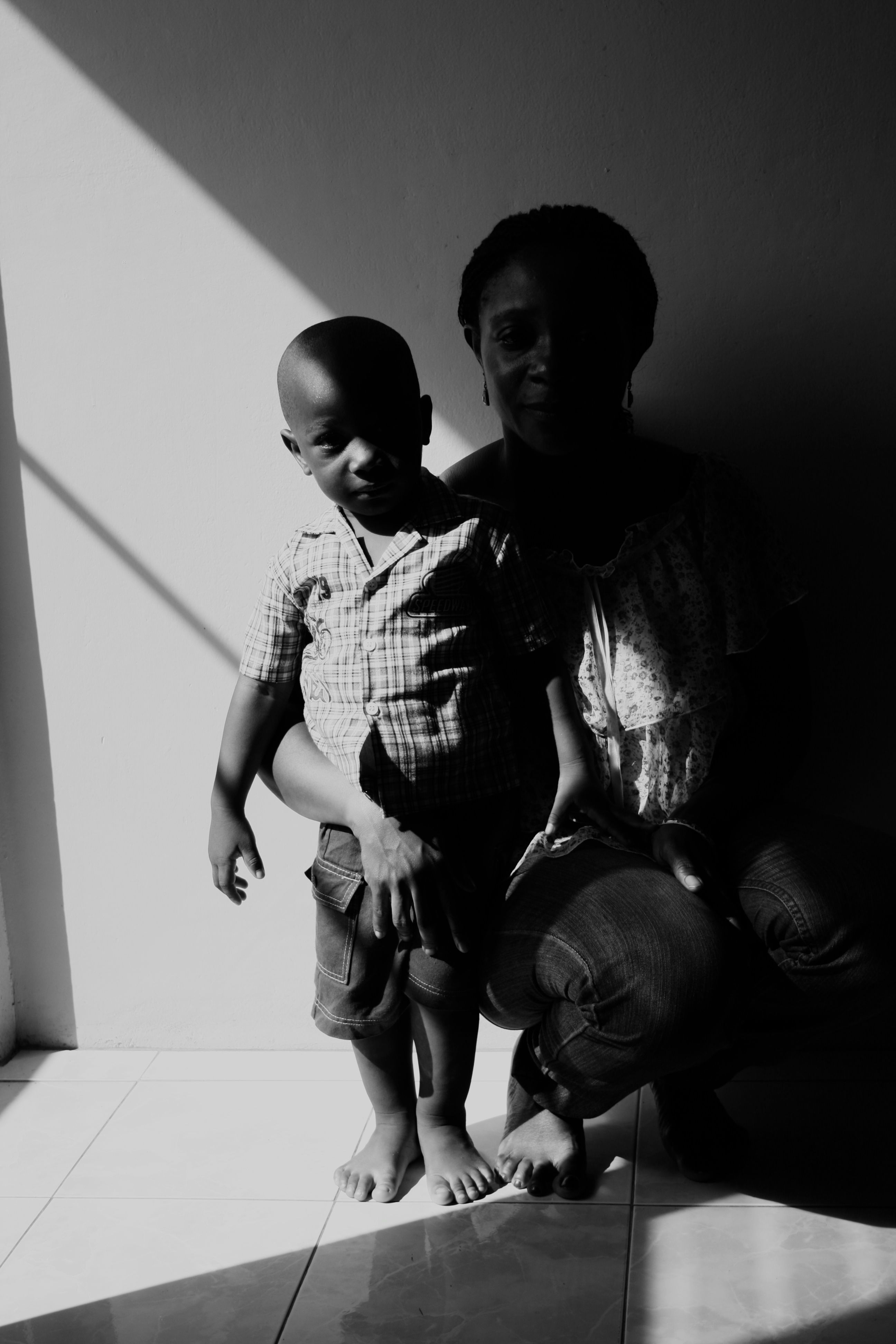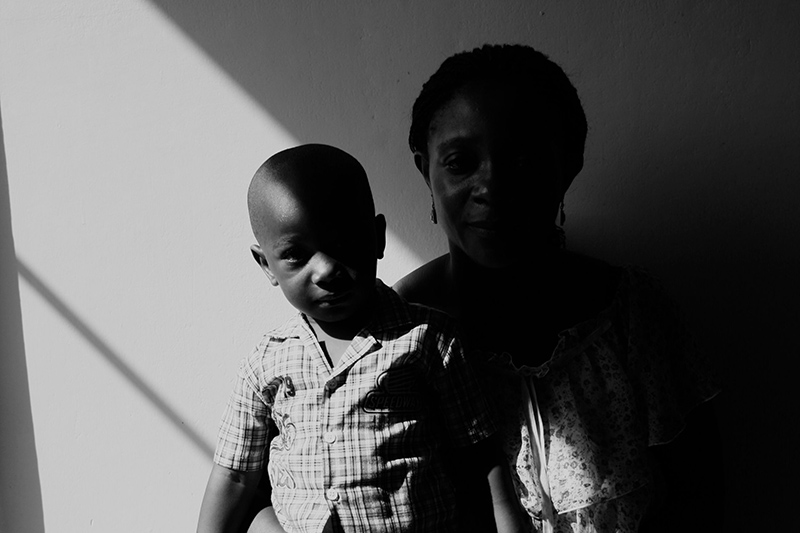Riziki fled her Central African village with her 1-year-old boy after soldiers kidnapped, abused and raped her. They were looking for her husband. Now she lives among Bangkok’s population of “invisible refugees.”
It started soon after her husband vanished about one year ago. A few days after the father of her baby son disappeared, eight soldiers came to Riziki’s home.
Despite her fervent protests that he was not a rebel, the soldiers kidnapped the woman, placed her in a blindfold and dragged her out to an isolated house in the forest tens of kilometers away from her village in the Democratic Republic of the Congo.
“They shouted, ‘If you keep crying, I am going to kill you!’” she whispered, wiping a tear from her eye.
When she could not tell them where her husband had gone, they beat her, and they raped her.
Those days of rape and abuse were the start of a harrowing flight from her central African home on a journey which eventually brought Riziki, now 32, into the ranks of thousands of “invisible refugees” living off the radar in Bangkok.
Riziki, who did not want to use her real name because of her legal status, was kidnapped from her home in South Kivu, an eastern province in the Democratic Republic of the Congo (DRC) bordering on Burundi and Rwanda.
Her husband belonged to a tribe known as the Congolese Tutsis, who were suspected by the government of being part of an armed faction which has rebelled time and again against since 1997, after they were stripped of citizenship.
Much suspicion and animosity divides the communities of South Kivu, as tribal tensions persist between the Banyamulenge tribe of her husband’s family and supporters of the Hutu militia which instigated the ethnic cleansing of Tutsis in Rwanda 20 years ago.
Riziki was abused for two days by the men who abducted her. After that, she was moved to a second house, where drunken men armed with machetes beat, interrogated and raped her again.
Early the next morning, just as dawn was breaking, she escaped, her clothes torn and bloody. “A passing car found me on the road. He brought me to the hospital,” she said. “They gave me medicine.”
Just four days later, Riziki walked out of the hospital only to be abducted by soldiers yet again as she walked down the street. They transported her against her will to another of their camps.
“Finally I was able to call my sister, and she agreed to give them USD1,000 to let me go,” Riziki said.
It was the beginning of her journey as a refugee.
The next afternoon she was smuggled in the back of a van into Kenya where she was reunited with her 1-year-old son, Harold, who had been cared for by a neighbor, at the Burundian border. She also regained her Congolese passport then moved through Burundi.
On the Jan. 4, 2013, she flew to Bangkok.

Riziki and her son Harold, 2, now live in Bangkok while seeking recognition from the UN as refugees, a long process that can take up to three years. Meanwhile, they must stay off the radar or risk detention by Thai authorities, who do not recognize international law regarding refugees and consider all to be illegal migrants subject to deportation.
Off the Radar
Riziki is now one of the nearly 100,000 refugees and asylum seekers in Thailand, a nation which does not recognize refugee status and considers all to be illegal migrants subject to deportation.
Of the 96,403 estimated to be in Thailand as of mid-2013, according to the United Nations, more than 91,000 are Burmese refugees on the border. Thirty or so other nationalities comprise the remaining 5,400 or so, including Sri Lankan, Pakistani, Vietnamese ethnic minorities such as the Hmong, as well as Africans such as Somalians and Congolese.
Refugee advocates say the number of those living “invisibly” in Bangkok are probably higher then their estimates, but asylum seekers are often not aware of their international rights to protection, and slip under the radar out of fear of arrest and detention.
About 4,000 non-Myanmar refugees have applied for recognition and assistance with the UN Refugee Agency, but consensus holds that number vastly underestimates Bangkok’s invisible refugee population.
“When police officers meet refugees on the street, the common practice is to arrest them and extort them for whatever they can get in exchange for release,” said Phil Robertson, the deputy executive director of Human Rights Watch’s Bangkok-based Asia division.
African refugees are at particular risk of harassment and discrimination from the Thai community, according to Asylum Access Thailand, an international NGO headquartered in San Francisco that provides legal aid to an estimated 100,000 refugees worldwide per year.
Asylum seekers who are aware of the UN process and pay traffickers to bring them to safety are often shocked at the minimal international assistance and protection they are provided upon arrival.
“Many refugees were unaware how difficult conditions would be in Thailand before they came, often having been misled by agents or people-smugglers,” Asylum Access notes.
Several reasons see many end up in Thailand. It’s not difficult to obtain a tourist visa, and the cost of living is accessible to those arriving with little money. But even more so, Thailand remains both a hub and destination for human smuggling and its attendant infrastructure.
The process to obtain refugee status recognition and resettlement is lengthy — upward of three years — during which time “children are regrettably without appropriate education, and refugees are without access to stable livelihoods, health care and suitable housing,” said Junita Calder, the Asia Pacific Advocacy officer for Jesuit Refugee Service, an international humanitarian NGO that provides temporary aid to recently arrived refugees.
Eleven months ago, not long before more than 1,000 would die in a chemical weapons attack in his hometown of Homs, Tawfiq escaped the Syrian civil war through Beirut and ultimately to Bangkok. The 34-year-old fled with his wife Shala and 7-year-old son, Abbas, after Tawfiq was tortured inside a secret Damascus jail and his business destroyed by bombs.
While the family was relieved to escape Syria alive, they feel frustrated with the speed of UN bureaucracy.
“Abbas has not been vaccinated in two years,” Shala said. “And what will he do without an education?”
While Thai law permits all children to attend school, language barriers and cultural differences make this difficult, according to JRS.
For Riziki, that means resettling into a new home before Harold gets much older.
“I am glad Harold is only 2 years now, he is only starting to learn the alphabet,” Riziki said.
Unable to Work
Refugees in Thailand are not legally allowed to work and often live for months without sufficient resources to meet all of their needs.
“Sometimes we don’t know where our next meal will come from,” Riziki said with a frown. “We just go day-by-day.”
Riziki panicked last month when her temporary housing assistance from the Jesuits ended.
“I was so scared, I did not know what I was going to do, how I would live,” she said.
Fortunately her church offered to pay her rent and provide dry rice and beans for meals.
Living that close to the bone is how many survive, according to JRS. They fled horrors to scrape by on limited financial assistance from the UNHCR, NGOs and faith-based groups, but the numbers of people displaced by the world’s conflicts and disasters far exceed the resources available.
“The majority have fled their home countries quickly and arrive with little in their pockets,” Calder said. “We try to help them as much as we can.”
But similar to many the thousands of other refugees struggling to survive in Bangkok, Riziki wishes she could work.
While some refugees work in the informal economy, they suffer “increased risks of exploitation and abuse, and of coming into contact with the authorities,” explained Calder.
Refugees have a right to work, according to international law. The 1951 Refugee Convention has been signed by 144 countries worldwide. Thailand is not one of them.
In Fear of Detention
Under Thai law, all refugees and asylum seekers are considered illegal migrants, even those which have gained UN recognition.
“Thai law does not recognize being a [refugee] as a legal status in the country, meaning that even if a person is acknowledged by UNHCR as having a legitimate claim to protection, the Thai government won’t provide it,” said Human Rights Watch’s Robertson.
Part of the The Thai government’s strict stance on “irregular migration” reflects a wariness of immigration influxes that comes with being a relatively stable economic power in a less certain region.
As a coastal country sandwiched between lesser-developed Laos and Cambodia, Thailand is also neighbored by conflict-prone Myanmar where 143,000 people have been displaced by armed conflicts in Kachin and Rakhine states since 2011.
“If refugees are caught by immigration officials, it is often “a one-way ticket to indefinite detention … until the refugee is permitted to resettle,” Robertson explained.
Dozens of refugees and asylum seekers, including children as young as 2, are locked up in a quiet neighborhood near the popular evening watering holes of Sathon Road and Soi Ngam Duphli at the Suan Phlu Immigration Detention Centre.
The Thai Ministry of Foreign Affairs said they could not comment in time for this article’s publication as its office is currently closed due to the ongoing protests.
Prime Minister Yingluck Shinawatra has publicly stated support for the humanitarian asylum of the 77,765 Burmese refugees residing in nine camps along the Thai-Burma border, however she’s remained silent on the issue of urban refugees, who continue to fear imprisonment for themselves and their families.
“We think it is tough outside here, but it would be harder inside the detention center, especially for the children,” Tawfiq said.
The International Organization for Migration (IOM) runs a play center for detained children 3- to 15-years-old, but children’s advocates say it is not enough.
“Regardless of the conditions in which they are kept, detention has a profound and negative impact on children,” reports the International Detention Coalition, an umbrella network of more than 250 NGOs worldwide campaigning against the detention of children, in a 2012 study.
The UNHCR says refugee numbers will rise around the world as conflicts continue or deepen in places such as Syria, South Sudan and the Central African Republic, where 4.5 million, 43,000 and 232,000 people have been displaced, respectively.
With the influx of invisible refugees unlikely to decline, advocates for refugees have asked Thai officials to adopt more humane policies.
“The international community should be demanding that Thailand cease detaining asylum seekers in the UNHCR application process, and recognized refugees, and immediately release all those who are currently in detention,” Robertson said.
For individuals such as Riziki, who never wanted to leave her home until fear of further violence and rape drove her out, there are no demands for special treatment.
“We just want to live, to work, and to be safe,” she said.





Reader Interactions